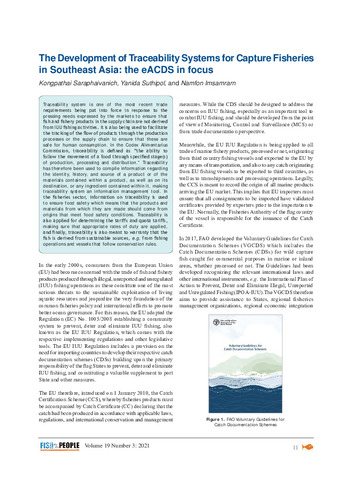The development of traceability systems for capture fisheries in Southeast Asia: the eACDS in focus
Share
Abstract
Traceability system is one of the most recent trade requirements being put into force in response to the pressing needs expressed by the markets to ensure that fish and fishery products in the supply chain are not derived from IUU fishing activities. It is also being used to facilitate the tracking of the flow of products through the production processes or the supply chain to ensure that these are safe for human consumption. In the Codex Alimentarius Commission, traceability is defined as “the ability to follow the movement of a food through specified stage(s) of production, processing and distribution.” Traceability has therefore been used to compile information regarding the identity, history, and source of a product or of the materials contained within a product, as well as on its destination, or any ingredient contained within it, making traceability system an information management tool. In the fisheries sector, information on traceability is used to ensure food safety which means that the products and materials from which they are made should come from origins that meet food safety conditions. Traceability is also applied for determining the tariffs and quota tariffs, making sure that appropriate rates of duty are applied, and finally, traceability is also meant to warranty that the fish is derived from sustainable sources, e.g. from fishing operations and vessels that follow conservation rules.
Suggested Citation
Saraphaivanich, K., Suthipol, Y., & Imsamrarn, N. (2022). The development of traceability systems for capture fisheries in Southeast Asia: the eACDS in focus. Fish for the People , 19(3), 11-19. http://hdl.handle.net/20.500.12066/6758


